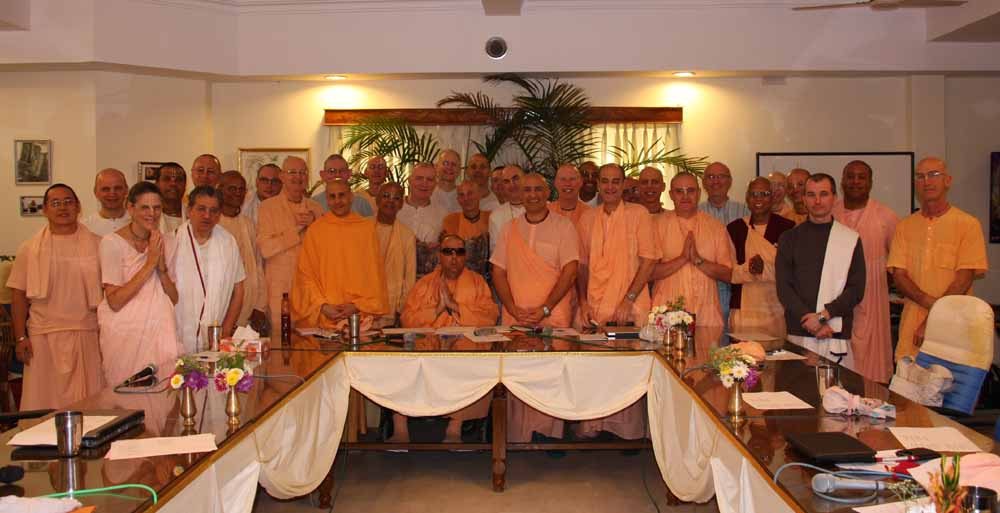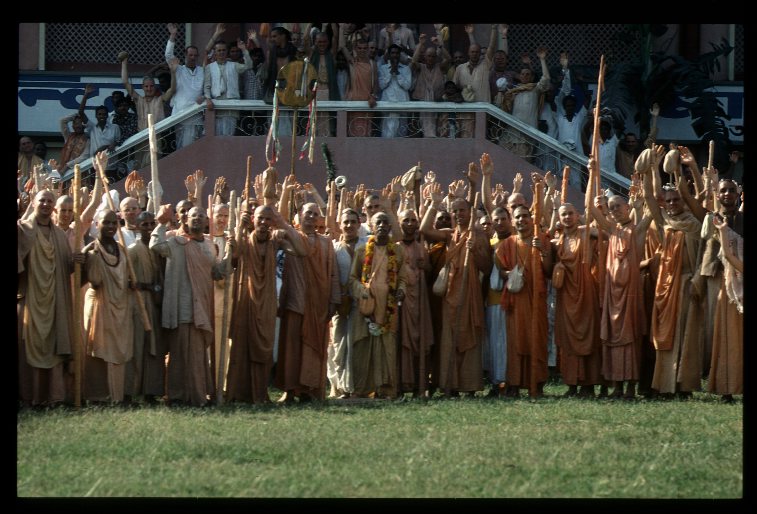.jpg)
His Divine Grace A.C. Bhaktivedanta Swami Prabhupada, Founder-Acarya of the International Society for Krishna Consciousness (ISKCON), established the Governing Body Commission (GBC) to be the ultimate managing authority for the society. In ISKCON’s Direction of Management written on July 28, 1970.
Srila Prabhupada states:
As we have increased our volume of activities, now I think a Governing Body Commission (hereinafter referred to as the GBC) should be established. I am getting old, 75 years old, therefore at any time I may be out of the scene, therefore I think it is necessary to give instruction to my disciples how they shall manage the whole institution. They are already managing individual centers represented by one president, one secretary and one treasurer, and in my opinion they are doing nice. But we want still more improvement in the standard of temple management, propaganda for Krishna consciousness, distribution of books and literatures, opening of new centers and educating devotees to the right standard.
Srila Prabhupada reaffirmed the position of the GBC in his final will drafted in June, 1977:
The Governing Body Commission (GBC) will be the ultimate managing authority of the entire International Society for Krishna Consciousness.
At present, the GBC body is comprised of thirty-five members who are individually responsible for overseeing the management and spiritual standards of ISKCON centers in assigned geographic regions. GBC members also supervise specific projects, initiatives, and ministries. Following the instructions of Srila Prabhupada, the GBC body convenes yearly in Mayapur, West Bengal for their Annual General Meeting, during which time they discuss proposals, specific issues and projects within ISKCON, and pass resolutions by way of a voting process.
Governance structure
 The GBC’s primary responsibility is to preserve, disseminate and carry out the instructions of Srila Prabhupada, and is entrusted with the task of overseeing the management and spiritual standards of all ISKCON centers, affiliated projects and members. Working under the GBC are additional managerial authorities such as regional governing bodies (RGBs) and temple presidents. An executive director, ISKCON ministers and GBC deputies further support the GBC in their duties.
The GBC’s primary responsibility is to preserve, disseminate and carry out the instructions of Srila Prabhupada, and is entrusted with the task of overseeing the management and spiritual standards of all ISKCON centers, affiliated projects and members. Working under the GBC are additional managerial authorities such as regional governing bodies (RGBs) and temple presidents. An executive director, ISKCON ministers and GBC deputies further support the GBC in their duties.
Such proceedings continue today. At present, there are thirty-five GBC members, each member elected to the position by the GBC body itself. The majority of GBC members are also zonal secretaries—GBC members who supervise the management and spiritual standards in specific geographic regions, and who regularly submit reports to the governing body. Srila Prabhupada wrote that “The GBC member is supposed to know everything and anything about the condition and situation of all matters within his jurisdiction,” however “GBC does not mean to control a center. GBC means to see that the activities of a center go on nicely…”
The governing body is administered through a GBC executive committee (EC) that consists of a chairman, vice chairman and secretary. These executive posts are held for one-year rotating assignments after which time the chairman’s term of office expires, the vice chairman succeeds the chairman, and the secretary succeeds the vice chairman. The governing body then elects a new secretary to join the executive committee each year. Duties of the GBC executive committee include managing issues with global consequence, attending to emergency situations, implementing resolutions, and facilitating the annual general meeting.

According to Srila Prabhupada’s directions, all ISKCON temples are financially independent; yet function under the ecclesiastical management of the GBC. A temple president, who is responsible for carrying out the mission, locally manages each ISKCON temple. While working under the supervision of their assigned GBC zonal secretary, temple presidents are encouraged to act with local initiative and are responsible for overseeing all functions of a temple, Deity worship, congregational development, ISKCON events within the community, care of temple residents, building maintenance, and financial stability. Moreover, temple presidents have the responsibility of maintaining in their local center ISKCON’s spiritual standards.
To increase the productivity of the GBC are additional positions—namely the executive director, ISKCON ministers and GBC deputies. Nine divisional directors, covering areas such as administrative/systems development, devotee care, legal, accounting, regulatory compliance and community relations, assist the executive director in carrying out these tasks. The executive director and divisional directors all function under the direction and authority of the GBC.
ISKCON ministers are individuals appointed by the GBC to become expert in their field and oversee a specific mission such as educational development, book distribution, communications and congregational development. All ISKCON ministers submit an annual report to the GBC and are invited to attend the GBC’s annual general meeting.

